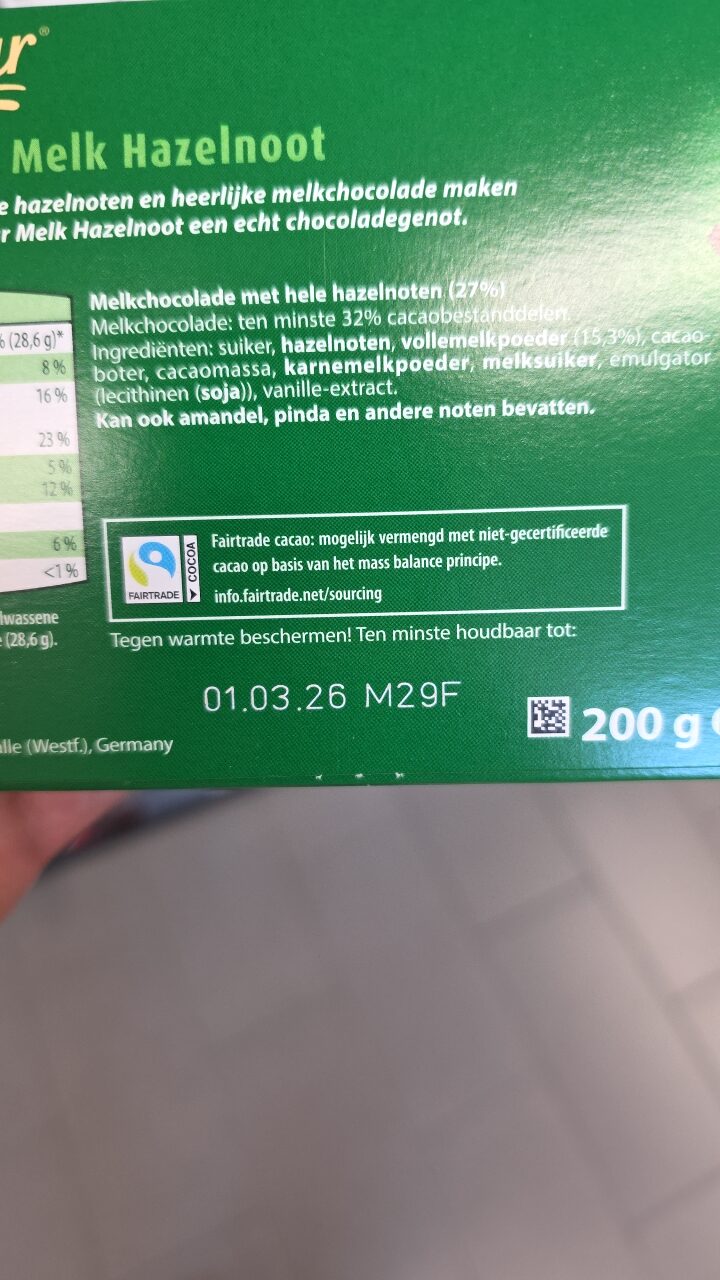
Barcode: 4065019033360
Melk Hazelnoot
HALAL
📝 Reason: Based on the provided ingredient list, there are no animal-based, alcohol, or haram E-Codes present (such as E120, E124, E354, E999). All items are either plant-based, milk-derived, or common food additives that are halal by default if not cross-contaminated. There are no doubtful or haram ingredients nor meat products requiring certification for this product. Refer to Quran 5:3 for haram categories, and rulings from IFANCA and Halal food scholars confirm the above ingredients as halal.
🏷️ Category: Chocolate
📄 Certificates: Fairtrade, 200 G, Vegetarisch
Ingredients:
Details
Understanding the Halal Status of Melk Hazelnoot Chocolate
The Melk Hazelnoot chocolate is a delectable treat that promises both flavor and enjoyment. But for conscious consumers, particularly those adhering to halal dietary laws, understanding its halal status is crucial. This article dives deep into the ingredients and their halal certification to affirm that yes, Melk Hazelnoot is indeed halal.
What Makes Melk Hazelnoot Halal?
According to the ingredient list provided, Melk Hazelnoot chocolate contains no animal-derived ingredients, alcohol or any classified haram E-codes. Each ingredient has been reviewed, and there are no concerns regarding cross-contamination. Key sources like Quran 5:3, alongside rulings from renowned halal certifying bodies such as IFANCA, confirm the halal status of these ingredients.
Ingredients Breakdown
Let’s examine the specific ingredients incorporated in Melk Hazelnoot:
- Melkchocolade: Milk chocolate is primarily derived from sugar, cocoa, and milk, with no inclusions of haram ingredients. Learn more about milk chocolate here.
- Hele Hazelnoten: Whole hazelnuts are naturally sourced from plant sources, confirming their halal status. Find out more about hazelnuts here.
- Suiker: Regular sugar is generally considered halal unless processed with non-halal agents, which is uncommon. More insights on sugar can be found here.
- Hazelnoten: Hazelnuts, being a natural nut, are also classified as halal. Additional information on hazelnuts can be found here.
- Vollemelkpoeder: Whole milk powder is derived from milk and sustains its halal status unless contaminated with haram additives. Discover more about milk powder here.
- Cacaoboter: Cocoa butter is extracted from cocoa beans, falling under the category of halal due to its plant origin. Further insights on cocoa butter can be found here.
- Cacaomassa: Cocoa mass is produced from cocoa beans, without any haram substances present. Learn more about cocoa mass here.
- Karnemelkpoeder: Buttermilk powder is derived from milk and is halal unless mixed with haram additives. Details about buttermilk can be found here.
- Lecithinen (soja): Soy lecithin is derived from plants and is considered halal. Check the halal status of lecithin here.
- Vanille-extract: Vanilla extract can be produced using alcohol, but if specified as alcohol-free, it is halal. In this case, it’s assumed to contain no alcohol. Learn more about vanilla extract here.
- Amandel: Almonds are plant-based and are halal. Further information on almonds can be found here.
- Pinda: Peanuts are also derived from plants and deemed halal. Learn more about peanuts here.
Brand and Certification Context
While the brand name is unspecified, the Melk Hazelnoot chocolate comes with notable certifications, including Fairtrade. This assures consumers not only of the product’s adherence to halal standards but also its ethical sourcing and quality. The 200-gram package clearly communicates these values and assures that it aligns with vegetarian diets, catering to a broader spectrum of dietary preferences.
Conclusion
In summary, Melk Hazelnoot chocolate is identified as halal based on a meticulous review of its ingredients and certification. It stands as an ethical, tasty treat that adheres to Islamic dietary laws, making it suitable for all who prioritize halal products without compromising on flavor or quality.
